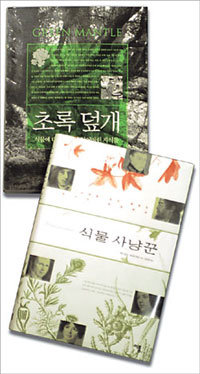Eulogy to Green Plants and Trees

How do humans, self-claimed the supreme living creatures, have better features than plants and trees? After all, plants and trees have stabilized the climate of the Earth by providing oxygen to the air and preserving moisture within them. Their seeds, fruits, and leaves have filled up our meal tables along with the animals that feed on the greens. The green-covered land and the fragrance of plants and flowers help provide good rest and solace and have inspired our spirits. In the meantime, we have spent most of the past century chopping and burning them.
These two books are complete songs of praise for ground plants that have preceded us and supported our abundant lives. The author of The Green Mantle, Michael Jordan, praises the plant kingdom by exploring myths and symbols of the East and West as well as plants and flowers that have appeared in the arts. The authors of The Plant Hunters Garden, Bobby J. Ward and Brian Mathew, applaud the lungs of the earth by sharing stories and discoveries of German plant hunters since the 17th century.
Among the eight prolific plant collectors in The Plant Hunters Garden, some have also uniquely surprised the world in different spheres. Alexander Humboldt, the father of modern geography, traveled throughout South America and had to sleep underneath the sand to ward off tropical mosquitoes. He wrote to his boss, the head of the Berlin Botanical Gardens, It is very uncertain if I will return alive. The possibility seems too low. However, Alexander and his co-worker, Goujoud Bonplan, overcame difficulties and accomplished great achievements; owing to their efforts, the exotic rose and dahlia from South America reached the eyes of Europeans.
The great German writer in the Romanticism era, Adelbert Von Chamisso, famous for his storybook Peter Schlemihls Strange Story, also appears in The Plant Hunters Garden. His travel around the world began with his participation in the Russian Romanoff regimes expeditionary force, and eventually extended to four oceans and five continents, excluding the Indian and the Oceania. To the head of guards protecting Chamisso in the Philippines the following command was delivered, Allow Mr. Chamisso, a gentleman who wants to observe everything from plants, trees, stones, and insects to ride a horse only during the daytime, and stop the guards as soon as he demands. Later, over 150 kinds of vegetation were named after Adelbert Chamisso, a literary figure from the Romanticism era.
If The Plant Hunters Garden profiles the figures and episodes in the history of plant exploration, the other book, The Green Mantle, researches the archetypes related to plants across civilizations as if it were the anthropology within the plants frames. For instance, the book says that rain was the sperm of God. It sounds awkward to people in modern society; meanwhile, this idea was shared by several primitive civilizations. They saw seeds sprout every spring after rain, so it was undeniable that the groom of all plants was God who gives rain to the Earth.
Trees were the subjects of reverence, sometimes reasonably qualified as Gods position in the society of ancient human beings. Historically, Jews had to get rid of the trees around the altar to Yahwist, who was the god of jealousy. After religions revering God as sharing common features with humans were established in human societies, trees still created veneration in each civilization. Within Taoism of the Chinese civilization, the pear tree was highly admired. In Christian civilization, fir trees have traditionally caused reverence. This originated from the story in which St. Boniface cut down the sacred oak tree in the Holy Land of the heresy, from which a fir tree sprung. Nowadays, fir trees worth 20 million pounds are used for Christmas trees in every Christmas season in Europe.
Ancient people believed that they would be punished by the heavens if they maltreated plants, says Jordan. For the past 150 years, at least 21 kinds of endemic plants vanished in the United Kingdom. As the Sahara Desert expanded to southern Africa, millions of people suffered starvation in the area. This might be a simple premonition to the future of the human species.
As the results caused by the stupidity of human beings in modern society are becoming more transparent, we are assigning more ethical meanings to plants. And, we should.
Yoon-Jong Yoo gustav@donga.com
Headline News
- Med professors announce intention to leave hospitals starting Thursday
- Bridge honoring Sgt. Moon Jae-sik unveiled in Pennsylvania
- Chief of Staff Chung tells presidential secretaries to stay away from politics
- US FTC bans noncompete agreements
- N. Korea launches cyberattacks on S. Korea's defense companies






